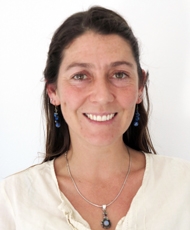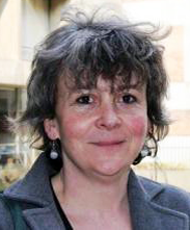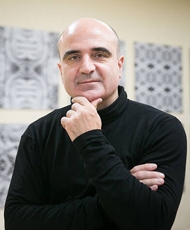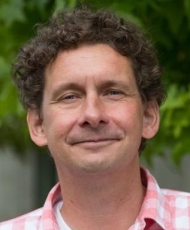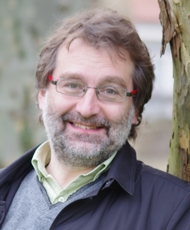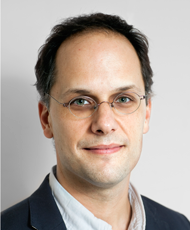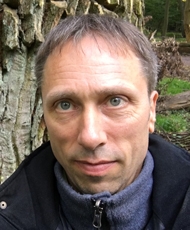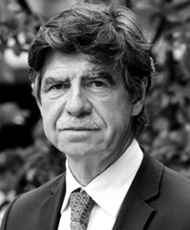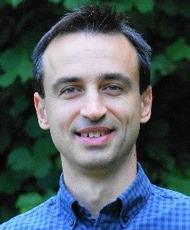YLP Mediterranean 2020
This edition of the YLP will be held online in July 2021
|
Sarah Adams is a communications expert at EFI Mediterranean Facility. She leads communication and dissemination activities in H2020 projects and for EFI’s Mediterranean Network. She is currently focussing on developing new techniques and tools for science-communication, collaborating on EFI’s science-media initiatives and giving training on communication and presentation skills. She has broad experience managing international projects for NGOs in education, medicine and marine conservation. She has a Bachelor’s degree in French and Hispanic Studies and a postgraduate degree in Secondary Education.
|
|
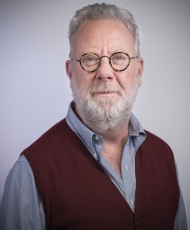 |
Simone Borelli holds a first degree in Forest Science from the Universitá della Tuscia, Italy, an M. Sc. in Watershed Management from the University of Arizona and Postgraduate Diploma in Public Management from the University of London. He has worked for the Food and Agriculture Organization of the UN (FAO) for over 20 years in different positions and is currently responsible for the Urban Forestry portfolio of the Forestry Division. In this capacity, he provides technical support to FAO field projects, provides policy advice to member countries and develops technical publications. He is one of the creators of the World Forum on Urban Forestry and the Tree Cities of the World programme In addition to FAO, he has also worked for WWF, IPGRI (now Bioversity) and as a consultant for public institutions and the private sector.
|
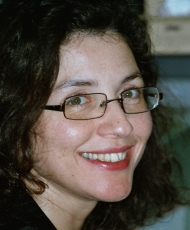 |
Meriem Bouamrane is an environmental economist, and has been a Programme Specialist in the UNESCO Division of Ecological and Earth Sciences, Man and the Biosphere programme since 2001. She is the coordinator of the EuroMAB Network, the oldest and largest network of the World Network of Biosphere Reserves (52 countries and 302 biosphere reserves including Canada and the USA). Meriem is responsible for research and training programmes on access to and use of biodiversity, following participatory approaches, and using biosphere reserves as research and demonstration sites. She has organised and conducted several workshops using different participatory techniques and tools in biosphere reserves and is involved in several research programmes on resilience of socio-ecological systems and participatory methodology. She is member of the PECS (Programme on Ecosystem change and Society) Scientific Committee, sponsored by UNESCO and ICSU. |
|
Christine Farcy is a senior researcher, invited lecturer, and international forest policy advisor. Her expertise are in forestry, national and international forest policy, forest planning, remote sensing, information systems, bridge between social and natural sciences, and science and policy cross-fertilisation. She is currently, among others, the chair of the European Forestry Commission of the Food and Agriculture Organisation of the United Nations (FAO) and the vice chair of the board of the European Forest Institute (EFI). She holds an MSc in agricultural engineering (forest and water) at University of Louvain (UCL) (1994) and a PhD in agricultural sciences and biological engineering at UCL (2005).
|
|
|
Mireia Gascon is a biologist specialised in environmental epidemiology working for the Institute for Global Health (ISGlobal) in Barcelona. She is currently focused on improving scientific understanding of the health impacts of the built environment and transport planning. Since January 2016 she is working on the EC-funded project BlueHealth, which is aimed at evaluating the potential for health promotion and disease prevention of ‘blue and green infrastructure’ in European countries.Since January 2019 she is also coordinating the postnatal follow-up of the Barcelona Life Study Cohort (BiSC), with the aim to study the impacts of prenatal exposure to air pollution on children’s neurodevelopment and other health outcomes.
|
|
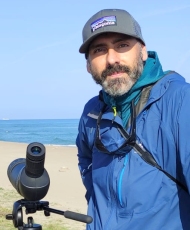 |
Javi Gómez is a senior environmental scientist. His expertise are in landscape ecology, biodiversity conservation and the management of natural protected areas, especially in the context of Mediterranean mountain regions. Most of his professional career has been dedicated to environmental education and communication in nature conservation and sustainability. He currently works as technician at Collserola Natural Park (Barcelona) in Public use, awareness and environmental education service. He holds an MSc in environmental sciences at Autonomous University of Barcelona (UAB) (2003) and a PhD in landscape ecology at ICTA-UAB (2010). |
|
Vicente Guallart is an architect from Barcelona who works in the development of projects for ecological cities and buildings across the globe with his company Guallart Architects. He has won numerous international competitions including Housing post-COVID in Xiong’an (2020), or Xianmi hu Master Plan in Shenzhen (2018). He was chief architect of the city of Barcelona (2011-15) leading major transformations in the city, which was named European Capital of Innovation in 2014. He was also founder of the Institute of Advanced Architecture of Catalonia (2001) from where he currently works in the development of Biocities, from the Valldaura Labs center. He is the author of numerous books, such as “ The self-sufficient city”, “Geologics” and “Plans and Projects for Barcelona”. |
|
|
Cecil Konijnendijk has studied, taught and advised on the role of trees and green space in our cities and towns for the past 25 years. His particular interests include green space governance (including community involvement), people-nature relationships and cultural ecosystem services, and urban forestry and urban greening. Cecil’s work has brought him across the globe, working in close dialogue with decision-makers and practitioners, and he remains eager to develop new research that has high practical relevance. Before his current post as a Program Director for the Master of Urban Forestry Leadership at the University of British Columbia (UBC), Cecil worked at Wageningen University (Netherlands), the European Forest Institute (Finland), the University of Copenhagen (Denmark), the Swedish University of Agricultural Sciences (Sweden), and the University of Hong Kong (Hong Kong, China). |
|
|
Inazio Martinez de Arano is Head of Office at EFI Mediterranean Facility since June 2013. He was previously Executive President at the Union of Foresters of Southern Europe (USSE), where he was involved in the analysis of forest-related policy developments at European and global levels, and the evaluation of the potential effects of policies and regulations on Mediterranean and South Atlantic forests and forestry. Mr. Martinez has wide experience working in a network organisation and with various stakeholders. He was the coordinator of forest research and a researcher at the Basque Institute for Agricultural Research (NEIKER) as well as a university lecturer in the University of Concepción, Chile. As President of the European Institute for Cultivated Forests (IEFC), he was involved in the establishment of the EFI Atlantic Regional Office. |
|
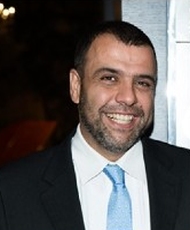 |
Dr. Chadi Mohanna, with a degree as an agricultural engineer from the Lebanese university in Lebanon, has a PhD from the Ecole Nationale Superieure Agronomique de Rennes. He served as Director of the Institute of Oceanography and Fisheries from 1998 to 2008. From 2008 until the present, he has been the Director of the Rural Development and Natural Resources Directorate at the Ministry of Agriculture in Lebanon. This directorate is in charge of forestry, fisheries, pastures, irrigation, and agroindustry. Dr. Mohanna is also a Professor at the Saint Joseph University of Lebanon. He was the team leader in charge of the preparation of the National Forestry Program and of the National Reforestation Program of Lebanon. He is also the national focal point for UNFF, FAO forest activities, and FLRM. Currently, Dr. Mohanna is the President of Silva Mediterranea, as well as a Vice Chairman of the NEFRC. |
|
Giorgio Mosangini is Team Leader of Green Entrepreneurship & Civil Society at the UN Environment - Regional Activity Centre for Sustainable Consumption and Production. He has 20 years’ experience in the International Development Sector in the Mediterranean and Latin America. He has been involved in projects covering various thematic areas, such as green entrepreneurship, civil society strengthening, local and rural development, sustainable development, gender and women rights and food security. He is author of several publications and methodological guides on Evaluation, Sustainability, Decentralised Cooperation or Social Communication. He holds a BSc in Political Sciences from the Université Libre de Bruxelles (ULB), Master in Development Studies from the Universitat Autònoma de Barcelona (UAB) and Specialist in Impact Assessment.
|
|
|
Bart Muys a full professor of forest ecology and management at KU Leuven (elected Europe’s most innovative university by Reuters in the last three years), where he is leading the forest nature and landscape division. His work of the last two decades focused on sustainability evaluation of forests and bioenergy systems. Recently he worked on climate change mitigation by forests and wood products, the role of biodiversity for ecosystem services, and the restoration of tropical dryland and montane forests. He published over 300 scientific journal articles, and is mentioned as an essential science indicator (1% most cited scientists) in the domains of environment, agriculture and multidisciplinary research. He holds a PhD in forest science from the University of Gent, 1993.
|
|
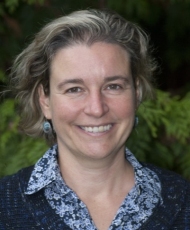 |
Mireia Pecurul has over ten years of experience working as a social scientist in forestry in Spain and the U.K. and she has participated in several European Projects (GoFOR, COSTE39, GoverNat, Simwood). Her research focuses on understanding the complex relationships between forestry and society. She works towards a better integration of forest communities’ needs and perspectives into research and forest related policies. Currently, Mireia’s work focusses on two thematic areas: forest governance and well-being. This work includes includes stakeholder analysis and actors’ discourses; qualitative scenarios; forest and environmental policy assessment; science-policy-practice interface; and evaluation of how projects that bring people into natural environments could change people’s sense of well-being and their behaviour.
|
|
Octavi Quintana is a Medical Doctor, specialised in Intensive Medicine, MPH University of Columbia. He is the Director of Málaga Hospital and Deputy Director of INSALUD. He is President of the Spanish Society for Healthcare Quality and President of the European Council Bioethics Committee. He is Vice-President of the EC Ethics European Group and Director of International Affairs for the Ministry of Health, Consumption and Social Welfare. He coordinates humanitarian aid in Rwanda, Burundi, Bosnia, Kosovo. He is Director for scientific programmes on Spanish television (TVE2) and Director of Scientific Research in the European Commission in Health, Energy and European Research and is Director of the PRIMA Foundation.
|
|
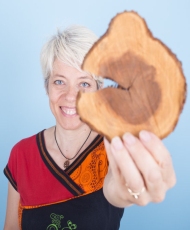 |
Laura Secco is an Associate Professor and Deputy Coordinator of the PhD School on Land, Environment, Health and Resources (LERH) at the Department of Land, Environment, Agriculture and Forestry (TESAF) at the University of Padova, Italy. Her main fields of interest are governance and policy analysis of forest and natural resources. She has published over 140 scientific papers and technical reports, on topics such as governance assessment at local level, indicators to evaluate social innovation and its impacts in rural areas, social network analysis, rural development and ecosystem services. She teaches forest governance issues related to conflict management and participatory approaches in three Erasmus Mundus MSc courses, where she is also coordinator of two e-learning courses. Laura has coordinated a work package on social innovation evaluation within the SIMRA H2020 project, and participated/participates in many international and national research projects (e.g. NEWFOREX, StarTREE, AGORA, EXIOPOL, Social Capital in Italian LEADER LAGs, ALTERFOR, Green4Care) and COST Actions (e.g. ORCHESTRA, CAPABAL, EUMIXFOR). She is co-funder and scientific adisor of ETIFOR, a spin-off of the University of Padova supporting responsible investments, restoration and sustainable management of natural resources worldwide. |
|
Metodi Sotirov is Senior Researcher & Assistant Professor at the Chair of Forest and Environmental Policy, University of Freiburg, Germany and Faculty Associate with the Governance, Environment and Markets Initiative, School of Forestry and Environmental Studies, Yale University USA. His academic research investigates political, socio-economic and psychological drivers of policy and institutional change, policy integration in a system of multi-level governance, and foresight for sustainable development. He has served as consultant and policy expert to international forest sustainability reports for FOREST EUROPE / FAO / UNECE, delivered expert inputs to the EU Standing Forestry Committee, DG Environment and DG Agriculture of the European Commission, and supported EU-level expert groups on EU Timber Regulation / FLEGT, Natura 2000 and Forests, Forest Protection and Forest Monitoring in Europe. He holds a Ph.D. in Forest and Environmental Policy Studies as well as M.Sc. in Sustainable Forest Management.
|
|
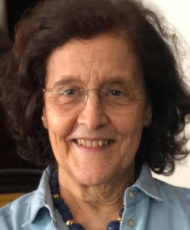 |
Margarida Tomé is a professor of Forest Biometrics at the School of Agriculture, University of Lisbon, where she teaches Forest Resources Inventory, Forest Modelling and Forest Management. Margarida is also the coordinator of the Forest Ecosystem Management under Global Change Group (ForChange), one of the research groups of the Forest Research Centre (CEF) that has the aim to develop scientifically sound methods for Atlantic and Mediterranean forest ecosystem management. The group has a strong focus on the transfer of knowledge to end-users by developing technological applications that integrate and make useful the research results. Margarida is a close partner with EFI, as well as with IUFRO where she was Division IV coordinator for the period 2006-2014 and co-chair of the IUFRO Task Force “Sustainable Planted Forests for a Greener Future” ” (2015-2019) and “Resilient Planted Forests Serving Society & Bioeconomy” (2019-present). She is the co-editor of the Springer series "Managing Forest Ecosystems”(ISSN: 1568-1319) with 34 books published since 2001 and co-author of the Springer book “Modelling forest trees and stands” published in 2012 and Editor of the journal Forest Ecology and Management. |
